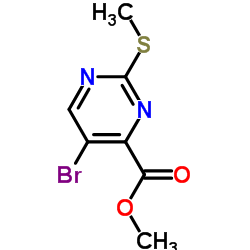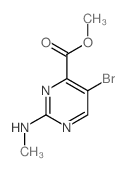Methyl 5-bromo-2-(methylthio)pyrimidine-4-carboxylate
Modify Date: 2024-01-03 19:28:51

Methyl 5-bromo-2-(methylthio)pyrimidine-4-carboxylate structure
|
Common Name | Methyl 5-bromo-2-(methylthio)pyrimidine-4-carboxylate | ||
|---|---|---|---|---|
| CAS Number | 50593-91-4 | Molecular Weight | 263.112 | |
| Density | 1.7±0.1 g/cm3 | Boiling Point | 348.7±22.0 °C at 760 mmHg | |
| Molecular Formula | C7H7BrN2O2S | Melting Point | 67ºC | |
| MSDS | N/A | Flash Point | 164.7±22.3 °C | |
| Name | Methyl 5-bromo-2-(methylsulfanyl)-4-pyrimidinecarboxylate |
|---|---|
| Synonym | More Synonyms |
| Density | 1.7±0.1 g/cm3 |
|---|---|
| Boiling Point | 348.7±22.0 °C at 760 mmHg |
| Melting Point | 67ºC |
| Molecular Formula | C7H7BrN2O2S |
| Molecular Weight | 263.112 |
| Flash Point | 164.7±22.3 °C |
| Exact Mass | 261.941162 |
| PSA | 77.38000 |
| LogP | 2.69 |
| Appearance of Characters | Solid | Pale yellow |
| Vapour Pressure | 0.0±0.8 mmHg at 25°C |
| Index of Refraction | 1.610 |
| Storage condition | 2-8°C |
| Water Solubility | Slightly soluble in water (0.42 g/L). |
Synonym:None Known Section 2 - COMPOSITION, INFORMATION ON INGREDIENTS
Risk Phrases: 36/37/38 Section 3 - HAZARDS IDENTIFICATION EMERGENCY OVERVIEW
Irritating to eyes, respiratory system and skin. Potential Health Effects Eye: Causes eye irritation. May cause chemical conjunctivitis. Skin: Causes skin irritation. May be harmful if absorbed through the skin. Ingestion: May cause gastrointestinal irritation with nausea, vomiting and diarrhea. May be harmful if swallowed. Inhalation: Causes respiratory tract irritation. May be harmful if inhaled. Chronic: No information found. Section 4 - FIRST AID MEASURES Eyes: Immediately flush eyes with plenty of water for at least 15 minutes, occasionally lifting the upper and lower eyelids. Get medical aid. Skin: Get medical aid. Flush skin with plenty of water for at least 15 minutes while removing contaminated clothing and shoes. Wash clothing before reuse. Ingestion: Never give anything by mouth to an unconscious person. Get medical aid. Do NOT induce vomiting. If conscious and alert, rinse mouth and drink 2-4 cupfuls of milk or water. Inhalation: Remove from exposure and move to fresh air immediately. If not breathing, give artificial respiration. If breathing is difficult, give oxygen. Get medical aid. Notes to Physician: Treat symptomatically and supportively. Section 5 - FIRE FIGHTING MEASURES General Information: As in any fire, wear a self-contained breathing apparatus in pressure-demand, MSHA/NIOSH (approved or equivalent), and full protective gear. During a fire, irritating and highly toxic gases may be generated by thermal decomposition or combustion. Extinguishing Media: Use water spray, dry chemical, carbon dioxide, or appropriate foam. Section 6 - ACCIDENTAL RELEASE MEASURES General Information: Use proper personal protective equipment as indicated in Section 8. Spills/Leaks: Clean up spills immediately, observing precautions in the Protective Equipment section. Sweep up or absorb material, then place into a suitable clean, dry, closed container for disposal. Avoid generating dusty conditions. Provide ventilation. Section 7 - HANDLING and STORAGE Handling: Minimize dust generation and accumulation. Avoid contact with eyes, skin, and clothing. Keep container tightly closed. Avoid ingestion and inhalation. Use with adequate ventilation. Wash clothing before reuse. Storage: Store in a tightly closed container. Store in a cool, dry, well-ventilated area away from incompatible substances. Section 8 - EXPOSURE CONTROLS, PERSONAL PROTECTION Engineering Controls: Facilities storing or utilizing this material should be equipped with an eyewash facility and a safety shower. Use adequate ventilation to keep airborne concentrations low. Exposure Limits CAS# 50593-91-4: Personal Protective Equipment Eyes: Wear appropriate protective eyeglasses or chemical safety goggles as described by OSHA's eye and face protection regulations in 29 CFR 1910.133 or European Standard EN166. Skin: Wear appropriate protective gloves to prevent skin exposure. Clothing: Wear appropriate protective clothing to prevent skin exposure. Respirators: A respiratory protection program that meets OSHA's 29 CFR 1910.134 and ANSI Z88.2 requirements or European Standard EN 149 must be followed whenever workplace conditions warrant respirator use. Section 9 - PHYSICAL AND CHEMICAL PROPERTIES Physical State: Solid Color: yellow Odor: slight pH: Not available. Vapor Pressure: Not available. Viscosity: Not available. Boiling Point: Not available. Freezing/Melting Point: 67-70 deg C Autoignition Temperature: Not available. Flash Point: Not available. Explosion Limits, lower: Not available. Explosion Limits, upper: Not available. Decomposition Temperature: Solubility in water: Specific Gravity/Density: Molecular Formula: C7H7BrN2O2S Molecular Weight: 263.11 Section 10 - STABILITY AND REACTIVITY Chemical Stability: Stable at room temperature in closed containers under normal storage and handling conditions. Conditions to Avoid: Dust generation. Incompatibilities with Other Materials: Oxidizing agents. Hazardous Decomposition Products: Carbon monoxide, oxides of nitrogen, oxides of sulfur, carbon dioxide, hydrogen bromide. Hazardous Polymerization: Will not occur. Section 11 - TOXICOLOGICAL INFORMATION RTECS#: CAS# 50593-91-4 unlisted. LD50/LC50: Not available. Carcinogenicity: Methyl 5-bromo-2-(methylsulfanyl)-4-pyrimidinecarboxylate - Not listed by ACGIH, IARC, or NTP. Section 12 - ECOLOGICAL INFORMATION Section 13 - DISPOSAL CONSIDERATIONS Dispose of in a manner consistent with federal, state, and local regulations. Section 14 - TRANSPORT INFORMATION IATA Not regulated as a hazardous material. IMO Not regulated as a hazardous material. RID/ADR Not regulated as a hazardous material. Section 15 - REGULATORY INFORMATION European/International Regulations European Labeling in Accordance with EC Directives Hazard Symbols: XI Risk Phrases: R 36/37/38 Irritating to eyes, respiratory system and skin. Safety Phrases: S 22 Do not breathe dust. S 26 In case of contact with eyes, rinse immediately with plenty of water and seek medical advice. S 36/37/39 Wear suitable protective clothing, gloves and eye/face protection. WGK (Water Danger/Protection) CAS# 50593-91-4: No information available. Canada None of the chemicals in this product are listed on the DSL/NDSL list. CAS# 50593-91-4 is not listed on Canada's Ingredient Disclosure List. US FEDERAL TSCA CAS# 50593-91-4 is not listed on the TSCA inventory. It is for research and development use only. SECTION 16 - ADDITIONAL INFORMATION N/A |
| Hazard Codes | Xi |
|---|---|
| Risk Phrases | 43-36/37/38-20/21/22 |
| Safety Phrases | 36/37-36/37/39-26-22 |
| HS Code | 2933599090 |
|
~80% 
Methyl 5-bromo-... CAS#:50593-91-4 |
| Literature: CANCER RESEARCH TECHNOLOGY LIMITED; HOELDER, Swen; BLAGG, Julian; SOLANKI, Savade; WOODWARD, Hannah; NAUD, Sebastian; BAVETSIAS, Vassilios; SHELDRAKE, Peter; INNOCENTI, Paolo; CHEUNG, Jack; ATRASH, Butrus Patent: WO2014/37750 A1, 2014 ; Location in patent: Paragraph 00149; 0046-0050 ; |
|
~% 
Methyl 5-bromo-... CAS#:50593-91-4 |
| Literature: Pierre, Fabrice; O'Brien, Sean E.; Haddach, Mustapha; Bourbon, Pauline; Schwaebe, Michael K.; Stefan, Eric; Darjania, Levan; Stansfield, Ryan; Ho, Caroline; Siddiqui-Jain, Adam; Streiner, Nicole; Rice, William G.; Anderes, Kenna; Ryckman, David M. Bioorganic and Medicinal Chemistry Letters, 2011 , vol. 21, # 6 p. 1687 - 1691 |
| Precursor 2 | |
|---|---|
| DownStream 1 | |
| HS Code | 2933599090 |
|---|---|
| Summary | 2933599090. other compounds containing a pyrimidine ring (whether or not hydrogenated) or piperazine ring in the structure. VAT:17.0%. Tax rebate rate:13.0%. . MFN tariff:6.5%. General tariff:20.0% |
| methyl 5-bromo-2-methylsulfanylpyrimidine-4-carboxylate |
| Methyl 5-bromo-2-(methylsulfanyl)pyrimidine-4-carboxylate |
| Methyl 5-bromo-2-(methylthio)pyrimidine-4-carboxylate |
| Methyl 5-Bromo-2-(methylthio)-4-pyrimidinecarboxylate |
| 4-Pyrimidinecarboxylic acid, 5-bromo-2-(methylthio)-, methyl ester |
| Methyl 5-bromo-2-(methylsulfanyl)-4-pyrimidinecarboxylate |


 CAS#:1009827-04-6
CAS#:1009827-04-6
